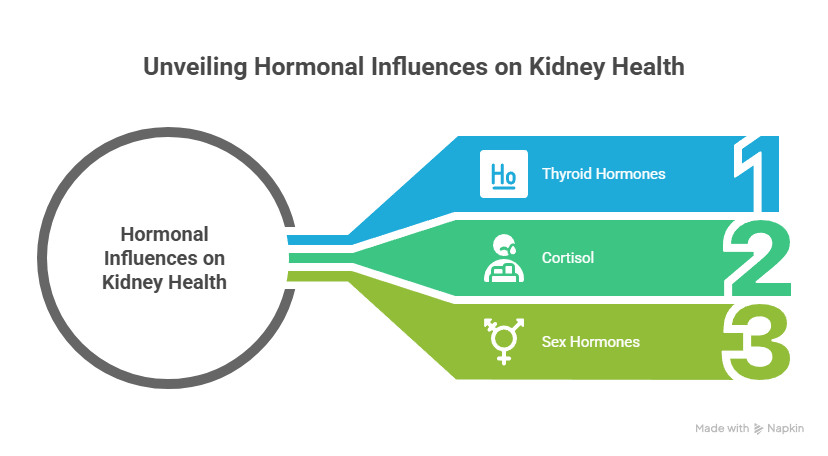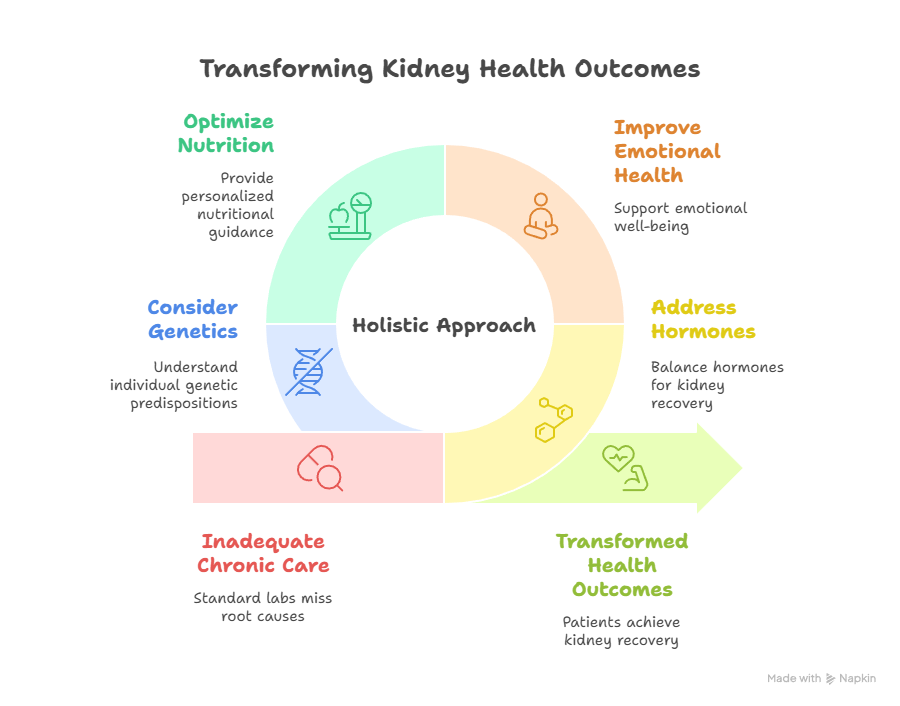
When we think about kidney disease, the usual suspects come to mind—high blood pressure, diabetes, poor hydration, or even genetics. But few people realize how deeply our hormones influence kidney health. These tiny chemical messengers have the power to either support your kidney resilience or gradually accelerate damage, often without clear symptoms until it’s too late.
As a board-certified nephrologist and functional medicine practitioner, I’ve spent years looking beyond the surface of conventional lab work to understand the “why” behind declining kidney function. And time after time, I see a pattern: hormonal imbalances that silently undermine the health of this vital organ system.
This blog dives deep into the three most impactful hormonal systems affecting your kidneys—and what you can do to restore balance, heal naturally, and take back your power.
The Thyroid-Kidney Connection: A Two-Way Street of Support or Strain
Your thyroid gland might be small, but its effects on kidney function are massive.
The thyroid regulates metabolism, heart rate, and energy production. But here’s what’s often missed—it also influences blood flow to the kidneys, sodium balance, and filtration rate (GFR). Even mild hypothyroidism (low thyroid function) can reduce kidney perfusion and slow down filtration, contributing to chronic kidney disease (CKD) progression.
In my clinic, I often see patients whose kidney function stagnates or declines until we support their thyroid properly. Many of these individuals have borderline TSH levels or missed cases of subclinical hypothyroidism that traditional medicine might not treat.
Values in Action: Why Thyroid Testing Matters
If you're struggling with fatigue, weight changes, constipation, or cold intolerance alongside declining kidney function, thyroid dysfunction could be the hidden piece. At iVitalityMD, we don’t stop at a standard TSH test—we assess free T3, free T4, reverse T3, and thyroid antibodies to get a complete picture.
When one of my patients, a 51-year-old woman with stage 3 CKD, was properly supported with thyroid medication, selenium, and a gut repair protocol, her GFR improved by 12 points in just six months. More importantly, her energy returned and her life felt like her own again.
Cortisol & Stress: The Hidden Kidney Saboteur
We often hear “stress kills,” and unfortunately, it can wreak havoc on the kidneys as well. Chronic stress leads to chronically elevated cortisol, our body’s primary stress hormone.
While cortisol is essential in the short term (it helps you respond to danger), prolonged elevation damages blood vessels, raises blood pressure, impairs blood sugar control, and creates a cascade of inflammation. Your kidneys, responsible for filtering blood and managing fluid and electrolytes, are directly impacted by this hormonal turbulence.
The Kidney Cost of Burnout
In functional nephrology, we understand that emotional health cannot be separated from physical health. Patients who are constantly in “fight or flight” mode often show signs of adrenal dysregulation, poor sleep, and blood sugar swings—all of which tax kidney function over time.
One of my patients, a hardworking entrepreneur in his late 40s, had a GFR of 45 and protein in his urine. Despite improving his diet and blood pressure, he plateaued—until we addressed his stress load. Through guided breathwork, adaptogens like ashwagandha and rhodiola, and better sleep hygiene, we calmed his cortisol rhythm. Within four months, his kidney labs improved, and his headaches and sleep issues resolved.
Values in Action: Healing Begins With Nervous System Regulation
Your health isn’t just about what you eat or which medications you take. It’s also about how safe your body feels. Healing requires moving out of a state of chronic stress and into rest, digest, and repair mode.
We teach our patients simple, sustainable ways to calm their nervous system—whether it’s through prayer, breathwork, nature walks, or technology-supported therapies like BrainTap. Because when the body feels safe, the kidneys can begin to heal.
Sex Hormones and the Kidney: More Than Just Reproductive Health
Most people think of estrogen and testosterone as reproductive hormones, but they’re also key modulators of inflammation, vascular health, and metabolic function—all central to kidney resilience.
Estrogen: A Protective Ally for Kidney Health
Estrogen helps maintain healthy blood vessels, improves nitric oxide availability, and has anti-inflammatory effects on kidney tissue. As women approach menopause and estrogen declines, their risk of CKD rises.
Many women with autoimmune diseases, fatigue, and increasing proteinuria find that supporting estrogen naturally through diet and lifestyle can shift the needle. Phytoestrogens found in flaxseeds, fermented soy, and legumes can mimic estrogen’s protective effects without overstimulating the body.
I recall a 59-year-old postmenopausal patient who had worsening kidney markers and rising blood pressure. By incorporating phytoestrogen-rich foods, improving gut health (which helps recycle estrogens), and balancing mineral intake, we were able to slow her kidney decline and reduce her need for medications.
Testosterone and Aldosterone: The Double-Edged Sword
While testosterone is important for muscle mass and energy, excess levels—especially when converted to DHT—can increase inflammation. In men with CKD, poor testosterone clearance due to reduced kidney function can lead to higher systemic inflammation.
Aldosterone, the hormone that regulates salt and fluid balance, when in excess, contributes to hypertension and kidney scarring. We often see this in patients with metabolic syndrome, insulin resistance, or chronic stress.
Values in Action: Personalized Hormone Support Over Hormone Suppression
We don’t chase hormone levels to fit within a lab range. Instead, we interpret patterns, evaluate symptoms, and tailor support using food, herbs, stress reduction, and only when needed, bioidentical hormone therapy.
Every hormone affects another. Balancing one system without understanding the others is like patching one hole in a leaky ship while the others continue to sink you. Our approach is about harmony, not hijacking the body’s natural wisdom.
Healing Hormonal Imbalances to Protect Your Kidneys
If you’re wondering where to begin, here are key principles we emphasize at iVitalityMD when it comes to hormone balance and kidney care:
1. Test, Don’t Guess
Many patients are put on medications without ever understanding what’s truly driving their symptoms. We believe in precision. Saliva hormone panels, 4-point cortisol mapping, and comprehensive thyroid panels allow us to identify the true disruptors of your health.
2. Support the Gut-Hormone Axis
Your gut is where hormones are metabolized and eliminated. Constipation, dysbiosis, or leaky gut can recycle toxic hormones and overload your kidneys. That’s why gut healing is always part of our hormone balancing protocols.
3. Use Nature’s Pharmacy First
Before turning to pharmaceuticals, we consider adaptogens (like maca, licorice root, ashwagandha), essential fatty acids, magnesium, and minerals that support endocrine function naturally.
4. Honor the Body’s Wisdom
Symptoms are not mistakes. They’re messages from your body asking for support. Instead of silencing these messages, we listen deeply and work with the body to restore balance.
The Bigger Picture: A Return to Personalized, Root-Cause Healing
Our healthcare system is exceptional at acute care. But for chronic disease—especially something as complex as kidney health—we need a different approach. One that sees each patient as unique, with root causes that are often invisible on a standard lab report.
By addressing hormonal imbalances, emotional health, nutrition, and genetics, we move from simply managing disease to transforming health outcomes.
I often remind my patients: your diagnosis is not your destiny. The body is incredibly resilient when given the right tools. Hormones don’t have to be the enemy—they can be your greatest ally in kidney recovery.

A Message of Hope
Whether you’ve been told your kidney function will only get worse or you’ve been prescribed another medication without understanding the “why,” know this: there is hope. Functional medicine offers a roadmap for not just surviving, but thriving.
Hormonal imbalances may be hidden, but their impact is very real. And the good news? They’re also addressable. By embracing a more personalized, integrative approach, you can reclaim your energy, protect your kidneys, and take back your life.
You don’t need to wait for your labs to get worse to start healing. You can begin today—by choosing to look deeper, ask better questions, and align with care that treats the whole you.
Special Offer: Take $50 off your first visit and discover how personalized, root-cause medicine can transform your kidney health.
